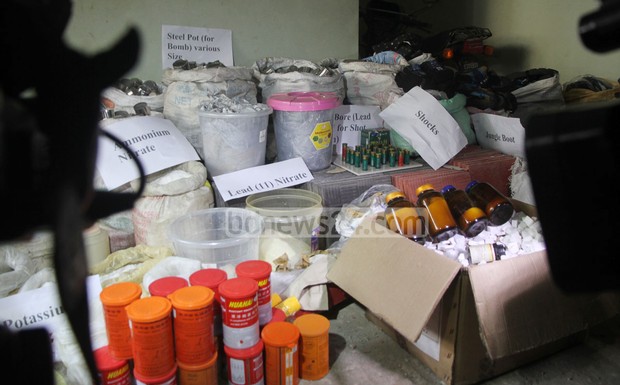A huge cache of explosives, bomb making material and crude bombs have been recovered from a house in Chittagong amid the BNP-led alliance’s ongoing violent blockade.
Four, including a woman, were arrested with the explosives from the port city’s Halishahar area during a night-long raid, says the Rapid Action Batallion (RAB).
Over 100 kg of explosives, bombs and ammunitions were found at the house, RAB Director General Benazir Ahmed told reporters at the port cityon Saturday.
“All this has been stocked up in the house to carry out large-scale sabotage.”
Islami Chhatra Shibir literature and documents of Islami Chhatri Sangstha were recovered from the house.
Shibir and Chhatri Sangstha are Jamaat-e-Islami’s student fronts.
According to the RAB chief, the trouble makers were planning to make bombs in water flasks used by schoolkids on a large scale.
“That is a perfect camouflage as everyone would think it was for carrying water. These kinds of bombs can cause a massive casualty.”
RAB chief Ahmed said the latest raid was part of the crackdown they had been carrying out since the busting of ‘terrorist training camps’ at Chittagong’s Hathajari on Feb 19 and Banshkhali on Feb 21.
The owner of the Halishahar house lives in the US. The building’s second floor was rented by the four arrested in January this year.
Those arrested during Friday’s night-long raid are Faijul Haq, 30, his sister Rahima Akter, 21 and Abdul Hye, 36.
Another youth ‘Jahed’, 22, had been detained from the house for questioning and was later shown as arrested.
Chief of the Chittagong-based RAB-7 Lt Col Miftah Uddin Ahmed said that Haq and his sister are relatives of Mawlana Azuz, who used to run the training camp at Banshkhali.
“Their leader is Mawlana Aziz, who has been arrested on Jan 7. Rahima (Akter) is a member of Shibir’s associate organisation Islami Chhatri Sangstha,” he said.
Apart from explosives, the recovery includes 76 crude bombs, 24 rounds of ammunitions, pipes and water flasks.
The explosives include 50kg Aluminum dust, 35kg Potassium Chloride, 10kg Sulfur, 8 kg of Sodium Amide, 5 liters of Nitrobenzene, 4 kg Arsenic Disulfide, 2.8 kg Ammonium Nitrate and 2kg charcoal.
Other than the explosives, nearly 200 pairs of jungle boots, sports shoes and socks, nylon belts were found in the house.
The recovered documents included charters of Islami Chhatra Shibir, martial art training certificates, a list of ‘Contacts and training’ from Feb 20 to Mar 7, contact numbers of TV reporters working in Chittagong and Jihadi books.
Who are these people?
RAB says Friday’s raid was an outcome of information gleaned from those arrested from terrorist hideouts in Chittagong’s Hathajari and Banshkhali on Feb 19 and 21 respectively.
The elite police unit claims that all of the 21 arrested, including Friday’s four, are members of a militant outfit.
But it is unclear which militant group they are involved with and RAB officials are silent on its identity.
“If we have disclosed (name of the outfit) on the 19th, then the raid on the 21st would not be possible. If we disclosed on the 21st then today’s recovery would not have been possible,” RAB 7 chief Lt Col Ahmed told bdnews24.com.
“We are doing our job and will let you know in good time,” he added.
Twelve people were arrested in the raid at a house in Hathajari on Feb 19.
Instructional videos made by militant outfits like al-Qayeda and Islamic State as well as videos on military training, plane hijacking and operating AK-47 assault rifles were found from the house.
A day later on Feb 21, terrorist training camp under the cover of a livestock farm was busted at Banshkhali.
Five were arrested and firearms including AK 22 training rifles, pistols, revolvers and over 700 rounds of ammunition were recovered.
“One would need a huge network to operate these kinds of underground activities. We are looking in to their local, regional and international connections,” RAB chief Benazir Ahmed said on Saturday.
He said that the arson and bombings on vehicles during the BNP-led coalition’s blockade has created a favourable environment for religious extremists.
Over 100 people ─ mostly burns victims ─ have died since the BNP-sponsored transport blockade across Bangladesh started on Jan 5.
“People are being burnt to death by petrol bombs. This has created a favourable atmosphere for religious extremists.
“Militants can take the advantage of the ongoing mayhem,” said the RAB chief.
Source: bdnews24










